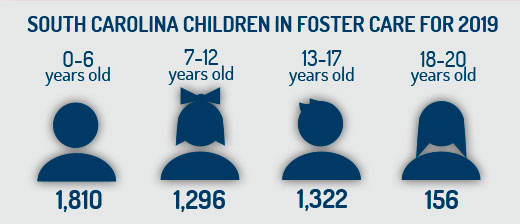The late Fred Rogers of the “Mr. Rogers” television show for children once said, “Anyone who does anything to help a child is a hero to me.” The 31st president of the United States, Herbert Hoover, said, “Children are our most valuable resource.”
When children are displaced or in danger, there is a problem. When they are legally removed from their home environment for their own protection, what happens next? That’s when foster care becomes a necessary and critical resource for providing protection, acceptance, and care for children. For Christian foster families, it also presents an opportunity for ministry through demonstrating to these at-risk children the love of God.
Veronica and Joe Yoder are new foster parents through Connie Maxwell’s foster care ministry. They sensed God’s leadership as they became involved in this ministry and strive to serve God through helping children in need. “Children are near to the heart of the Father. What a privilege to be able to serve along with other believers and meet the needs of these little ones,” they stated.
Paula Reed, director of foster care, and Haleigh Moore, foster home licensing specialist, lead the foster care ministry at Connie Maxwell. Reed said, “Kids in foster care are not the government’s kids, they are God’s kids — and that makes them the church’s responsibility. Sadly, churches have not stepped up to care for these children.”
Connie Maxwell president Danny Nicholson stated that the institution began its foster care ministry in the 1930s with a gift from the Duke Endowment. Recently, he noted, “The Duke endowment awarded us a $350,000 grant to teach the ‘Trauma Academy’ to foster parents.” The South Carolina Baptist Convention and WMU have partnered with Connie Maxwell, according to Nicholson, to “elevate foster care recruitment of families across the state.”
Foster care involves training, state licensing, and a commitment to care for at-risk children on a temporary basis. Following the separation from their parents, some children are able to return to the home, which is the main goal of foster care. If reuniting with the biological family is not possible, kinship foster care is an option. In some cases, parental rights may be terminated and the children placed for adoption. The main goal in the whole fostering process is providing the children a safe, caring and nurturing environment. During the separation time from the home, the Department of Social Services and private agencies are focused on creating a secure domestic atmosphere for the children.
Connie Maxwell is a fully accredited private licensing agency for families interested in foster care. If a family is unable to do foster care, there are other options such as becoming a resource family. In this case, the couple must pass a background check and submit a driving record from the DMV. Once approved, they can take kids to special events, day trips, etc., but cannot keep kids overnight. Another option is a respite family. Couples in this category must be licensed and can then mentor a child in residential care and invite the child (or children) for overnight visits throughout the year.
 In 2019, there were 4,584 children qualified for foster care in South Carolina, but there were less than 2,700 foster homes available. There are more children qualifying for foster care, but fewer people getting involved as foster parents. Reed emphasized “what that means is that South Carolina needs around 2,000 more foster homes to provide care for these children.”
In 2019, there were 4,584 children qualified for foster care in South Carolina, but there were less than 2,700 foster homes available. There are more children qualifying for foster care, but fewer people getting involved as foster parents. Reed emphasized “what that means is that South Carolina needs around 2,000 more foster homes to provide care for these children.”
The ideal target group of parents for Connie Maxwell is people of faith. This group is also the most difficult to persuade. They typically think about fostering for about two years before taking the initial step.
Some couples are concerned about becoming attached to the children they foster. Reed says, “Attachment is something we truly need. It’s okay to get attached. If you are going to get attached, then you will probably make a real good foster parent. Talk to people in your church. Make our foster children a mission of your church.”
How can qualified caregivers become foster parents? The first step is to pray. As God leads, the next step is to choose a licensing agency like Connie Maxwell. Once all the criteria have been met (including home visits, interviews, etc.), the couple will be licensed. Once the couple is licensed, it typically is a short period of time before they are notified of the need for a child or siblings to be placed in a foster home.
Reed noted, “If you can’t foster, you can support those who do by providing groceries, diapers, clothes, finances, childcare, tutoring, gift cards, laundry and more. Most of all, you can pray for these foster parents.”
January is Sanctity of Life month. While we rightfully focus on the tragedy of abortion, we must also think of those already born who suffer. In Matthew 18:10, Jesus said, “See that you do not despise one of these little ones, for I say to you that their angels in heaven continually behold the face of My Father who is in heaven.” Reed stated, “The Bible is telling us to take care of our children. God is telling us to take care of our children. That we are not taking care of them is in direct opposition to what He wants.”

